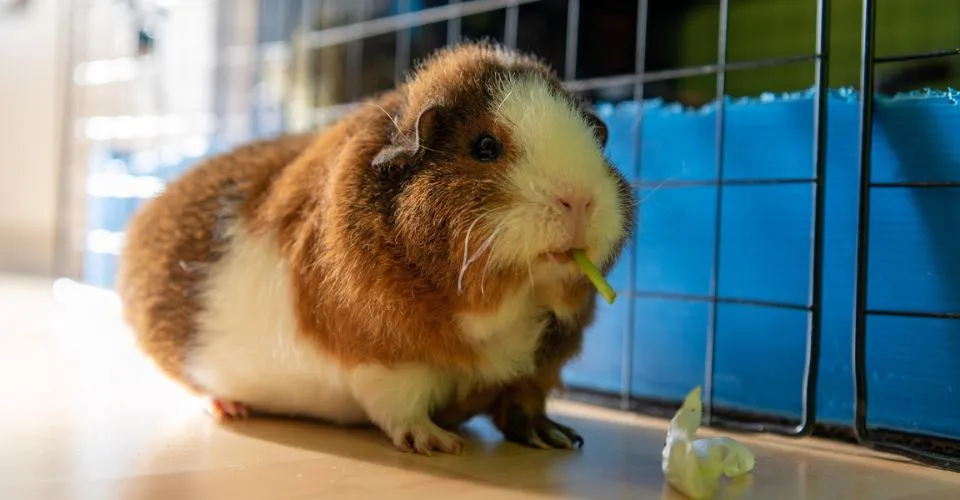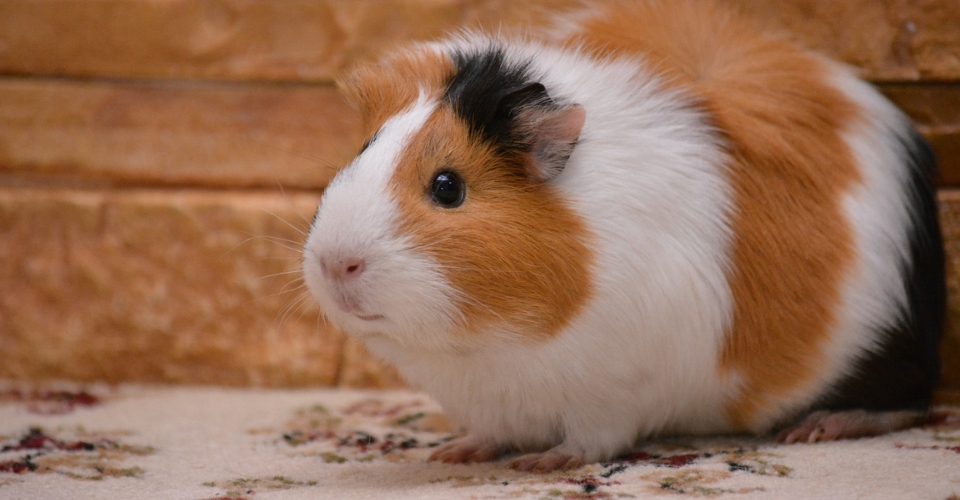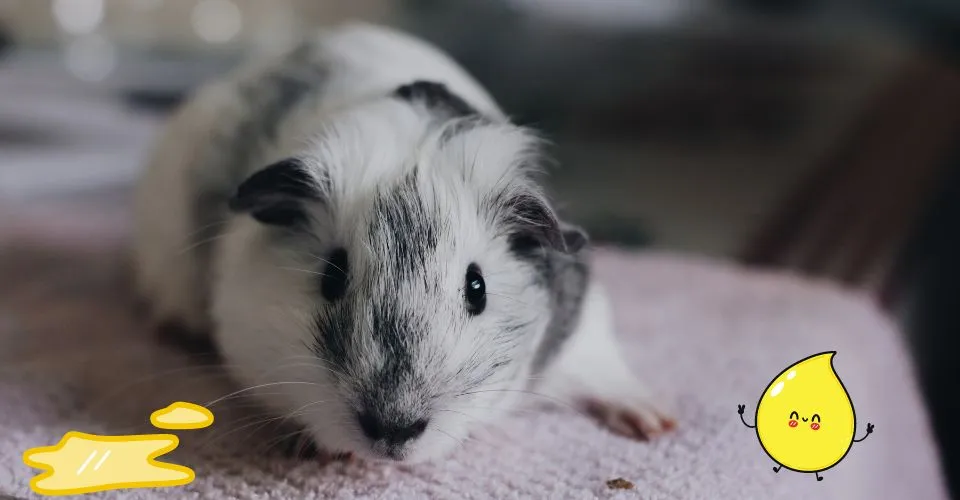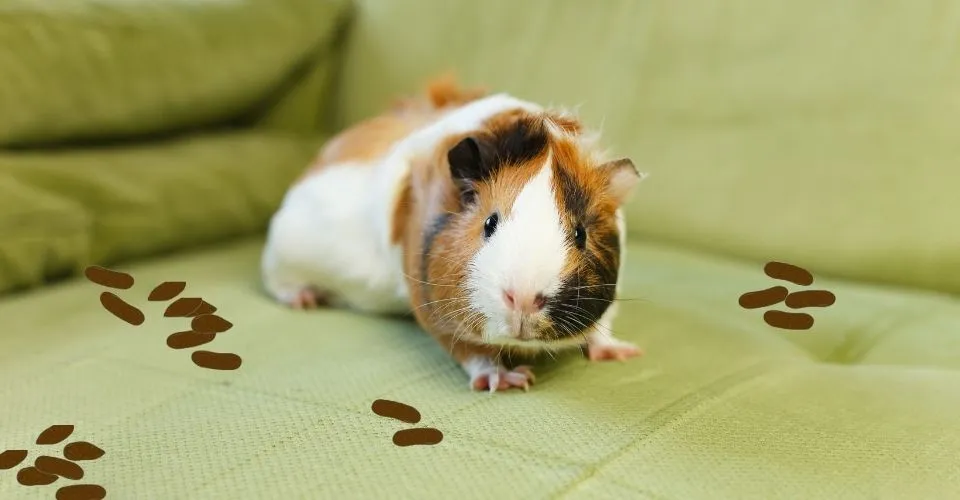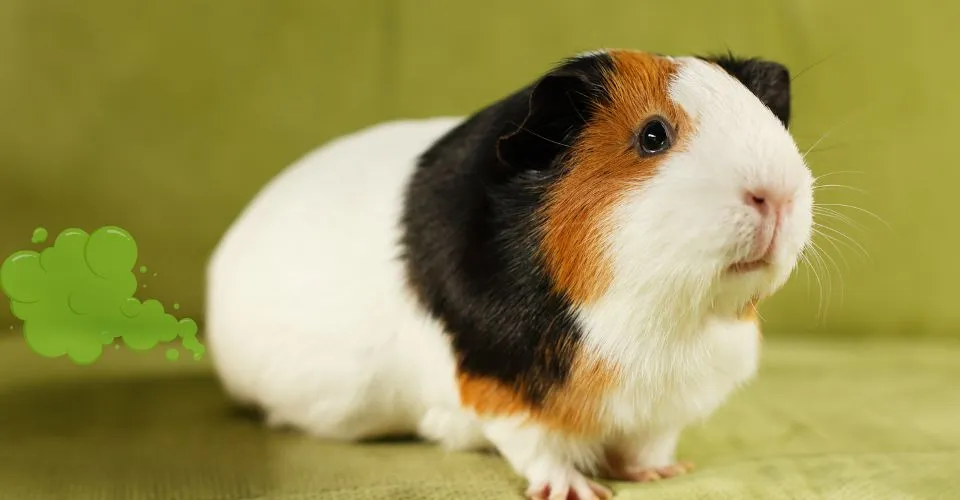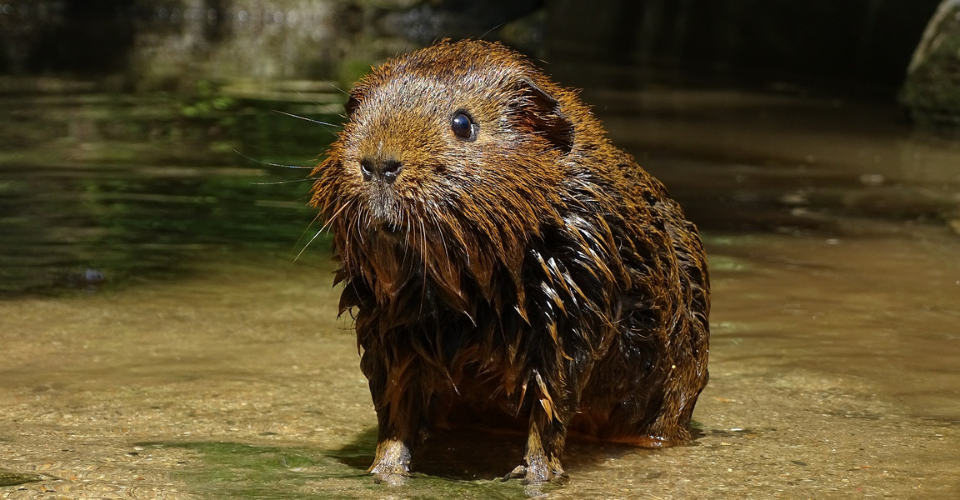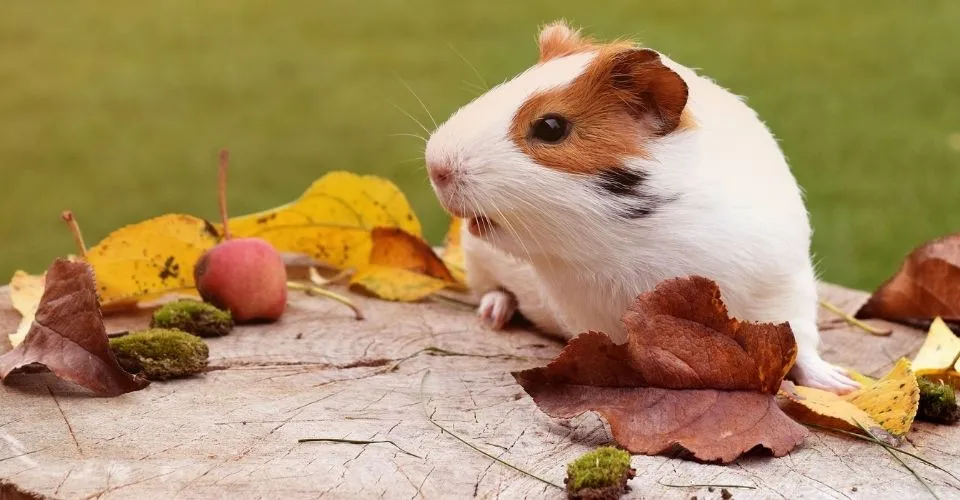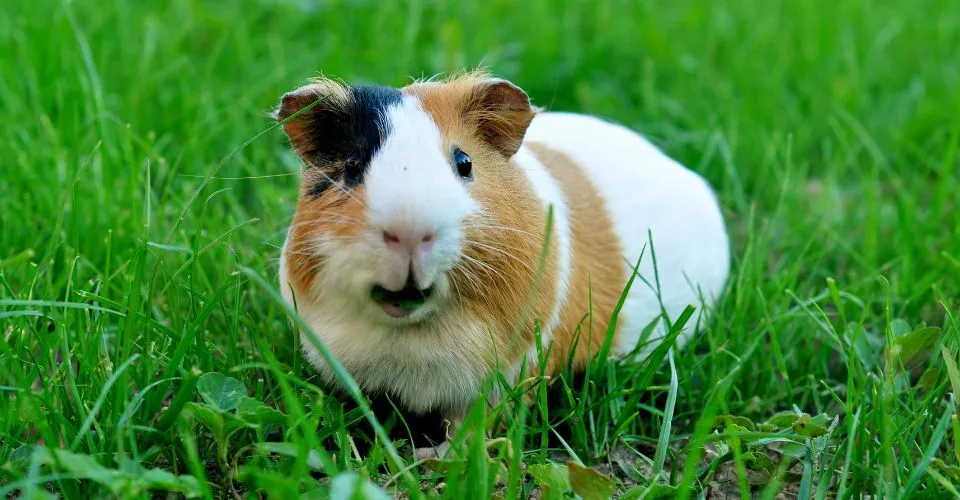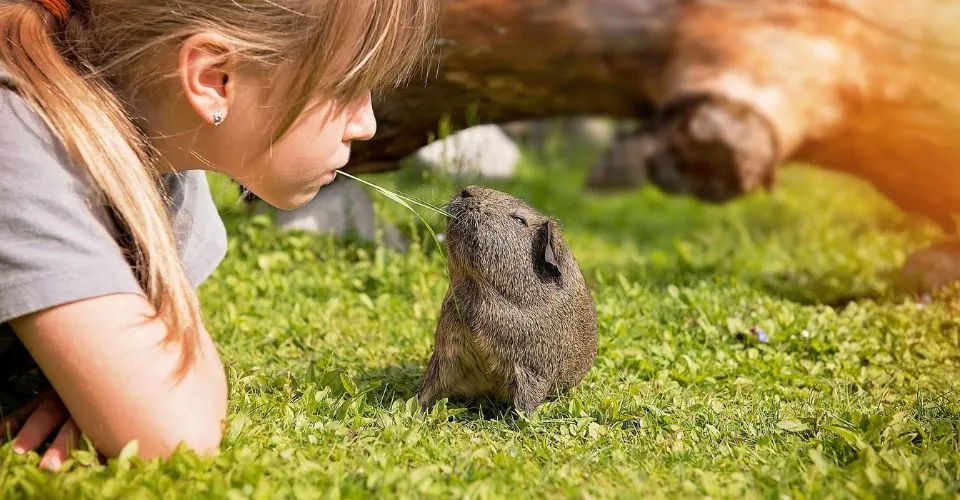Guinea pigs are smart little creatures. They communicate not only with their fellow guinea pigs but also with their owners through the characteristic guinea pig sounds and body language. Through the guinea pig voices like chirping, squeaking, purring, etc., and bodily actions and movements like popcorning, strutting, freezing, fluffing up, etc. guinea pigs are trying to send a particular message.
By understanding guinea pig vocals and bodily movements you can better understand how they are feeling or what is happening in their surroundings and how they are feeling about it.
In this article, we are going to focus solely on guinea pigs fluffing up. So, if your guinea pig fluffs up while eating or sleeping, continue reading. We are going to discuss all about it.
Why Do Guinea Pigs Fluff Up?
Guinea pigs fluff up and stick out their hair to look bigger and more formidable. They often do this while eating to deter other guinea pigs from stealing their food. However, guinea pigs may also puff up when they are cold or sick.
1. Guinea Pigs Fluff Up When Eating to Claim All the Food
Guinea pigs often fluff up when eating to look bigger and more formidable to other guinea pigs so that they don’t dare even think about stealing their food. It is their way of calling dibs on the food. If your guinea pig is only fluffing up when you offer him tasty treats like arugula, dandelions, basil, etc.; there is nothing to worry about. He is either fluffed up out of his joy for getting the tasty veggies or he is just trying to deter his cage mates from stealing his food.
If you are feeding frozen or cold veggies to your guinea pigs, chances are that he is fluffed up only because the veggies are cold.
Fresh Veggies are the best! While frozen guinea pigs are not dangerous, they are not as nutritious as fresh veggies.
Guinea pig hair sticking up in this case would only last for 30 minutes to an hour. Some guinea pigs may smooth down their fluffed fur as soon as their veggie is finished or when they are full and do not want to eat more of it.
2. Fluffed-Up Guinea Pig Could Be Cold
If there has been a change in the environmental temperature or you just fed something cold to your guinea pig, he might fluff up to maintain his body temperature.
If besides fluffing up, your guinea pig is also shivering and trying to burrow in their hay or under the guinea pig peed pad or whatever bedding is there in their cage, it could mean that they are feeling cold.
By fluffing up their fur, guinea pigs try to trap warm air and insulate themselves from the cold. Fluffiness when feeling a bit chilly would go away as soon as the guinea pig is all warmed up.
Guinea pigs are very sensitive to both heat and cold, so you have to make sure that they do not stay cold for much longer as it could deteriorate their health. The ideal temperature range for guinea pigs is 65 to 75 degrees Fahrenheit, according to the Humane Society.
If your guinea pig is fluffing up in a particular spot, you should check if there is any draft coming through and block it. You may also want to offer your guinea pig warm blankets and towels for them to burrow and curl up in.
You should also make sure that the guinea pig bedding is dry all the time. You may want to use guinea pig peed pads to soak up all the guinea pig pee and spills to keep guinea pigs dry. Using pee pads, ensure that your guinea pigs are not eating the pee pad. There is a layer of plastic underneath, that most guinea pigs love to nibble on.
3. Guinea Pig Puffed Up Not Eating is Probably Sick
While guinea pigs puffed up while eating is nothing to worry about, guinea pigs puffed up, and not eating is a sign of concern. It could mean that the guinea pig is sick. Guinea pigs are stoic creatures—they are very good at hiding their signs of sickness. So, if your guinea pig is sticking up his hair and not eating, you should start observing him closely, looking for other signs of sickness.
Common Signs of Sickness in Guinea Pigs • Lethargy • Sitting in one place • Decreasing appetite accompanied by weight loss • Hunched posture • Change in urine color • Change in poop color or texture
It could mean that he has a dental issue or it could be a sign of infection. If your guinea pig stays puffed up for more than a couple of hours without eating anything, you should talk to your veterinarian. If the situation persists for more than a day, your guinea pig could be in serious trouble.
So, if your guinea pig is fluffed up and not eating, you should immediately take him to a cavy-savvy veterinarian to rule out the probability of an infection or tooth problem.
4. Why Do Guinea Pigs Puff Up When They Sleep?
Guinea pigs are prey animals. In the wild they are always vulnerable to getting attacked and torn apart by a predator, this is the reason that guinea pigs sleep with their eyes open to stay alert even during sleep. Guinea pigs do have eyelids, but they rarely even blink out of fear of becoming prey to a predator. Just like it is a guinea pig’s prey instinct to not close their eyes, guinea pigs often fluff up while sleeping to look bigger and formidable so that they could deter potential attacks from predators lurking by.
Perhaps, fluffing up while sleeping is their way of giving a message to a predator lurking by that they are on alert, and chase by any predator would be futile—they will easily escape as they are big and on alert.
5. Guinea Pig Puffing Cheeks Could Have Abscess or dental Issues
The puffy or swelled cheeks indicate that your guinea pig either has tooth trouble or an abscess.
Tooth Trouble in Guinea Pigs
While most of the time it is the overgrown teeth that cause dental issues in guinea pigs. Guinea pig teeth may also get worn down at a weird angle that chewing on food hurts the guinea pig tongue. In both cases, the guinea pig’s tongue could get sore and swell, causing the guinea pig’s cheeks to appear puffed up.
Abscess in Guinea Pigs Mouth
Puffy cheeks could also indicate that your guinea pig has developed an abscess. An abscess is a pus-filled lump resulting from an infection that develops from a cut, puncture, or injury that may occur from chewing on the cage or fighting with a cage mate. Abscess would make guinea pigs very sensitive and guinea pigs might stop eating and become lethargic.
Whether it is a dental issue or an abscess, you should immediately take your guinea pig to a vet for puffed cheeks. The first that guinea pigs with puffed cheeks do is quit eating. As guinea pigs cannot live very long without food, you need to take your guinea pigs to a cavy-savvy vet immediately. While you are waiting for the appointment, you might start syringe-feeding your guinea pig.
Make Sure Guinea Pigs Is Not Bloated! Puffed up or fluffed up guinea pig means that it is the fur of the guinea pig that is sticking up and making guinea pig look bigger, there is no change in the actual size of the guinea pig's body. So, if it is the actual guinea pig body that has gotten bigger, your guinea pig is probably bloated, there is a gas buildup in his intestinal tract. Bloating often results in frequent farts. So, if your fluffed guinea pig is farting more often, you should immediately take your bloated guinea pig to see a vet experienced in exotic pets like guinea pigs.
Final verdict: Why Does My Guinea Pig Fluff Up?
Guinea pigs fluff up while eating to deter other guinea pigs from stealing their food. If it’s cold, the guinea pig may fluff up to maintain its body temperature by trapping heat. Moreover, puffing up could also mean that the guinea pig is sick, especially if he is not eating and showing other signs of sickness. If the guinea pig is fluffing while sleeping, he is probably trying to look formidable to predators lurking in the vicinity. Lastly, if it is only the guinea pig cheeks that are fluffed up, he probably has a tooth problem or abscess and needs immediate vet attention.
